Navigating China's influence: Insights from the State of Southeast Asia 2024 Survey
Southeast Asians recognise China's burgeoning influence in the region, but there are nuances to the geopolitical dynamics. The region needs to manage its relationship with the rising global power; China needs to address the lack of confidence that it will "do the right thing".
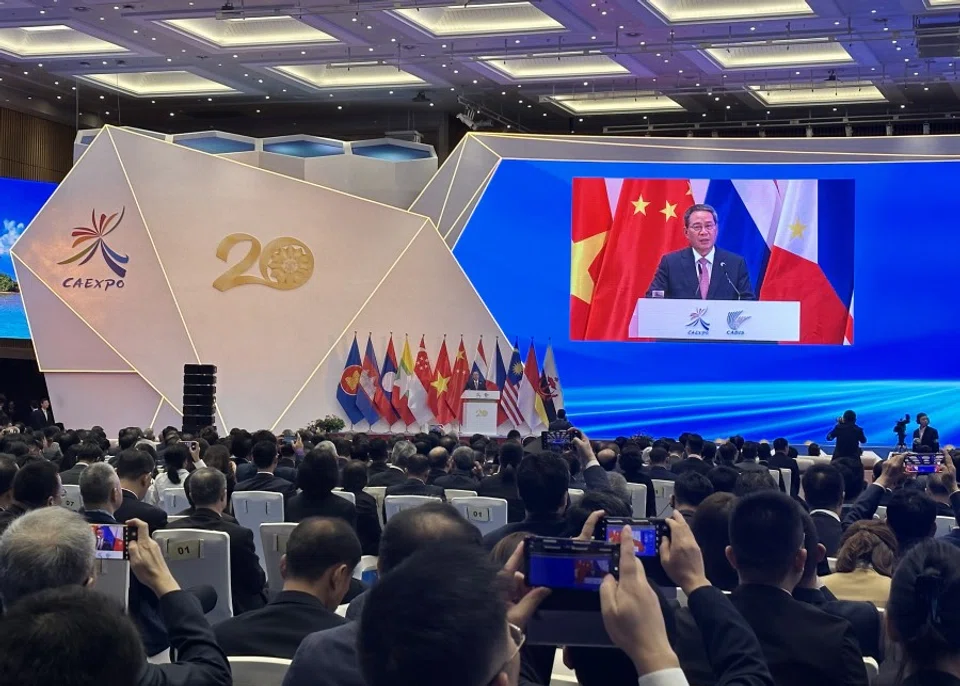
China's intensified diplomatic efforts within the region, both through ASEAN and bilaterally, have yielded significant dividends. The latest findings from the State of Southeast Asia 2024 survey underscore a notable surge in China's influence across Southeast Asia, with a growing number of regional respondents recognising its expanding role in the region.
Despite mounting concerns regarding China's ambitious regional agenda, including its expanding presence in Southeast Asia and its heavy-handed measures to assert domestic control through restrictive policies such as the new Counter-Espionage Law, there appears to be a growing acknowledgement within the region of China's steadfast commitment and active engagement.
China the preferred alignment choice
Amidst the deepening rivalry between China and the US, Southeast Asia has experienced a notable shift in sentiments. This year marks the first time that China has emerged as the preferred alignment choice. Among respondents to the survey, conducted in January-February 2024, 50.5% chose China over the US, compared to 38.9% the year before. Apart from the Philippines, Singapore and Vietnam, all countries in Southeast Asia have shown a leaning towards China, particularly those that have benefited from China's Belt and Road (BRI) Initiative, such as Malaysia, Indonesia, Laos, Brunei and Thailand.
... further echoed in a new question assessing dialogue partners' strategic relevance to ASEAN. China has been affirmed as the most strategically significant partner with a mean score of 8.98 out of 11, slightly ahead of the US at 8.79.
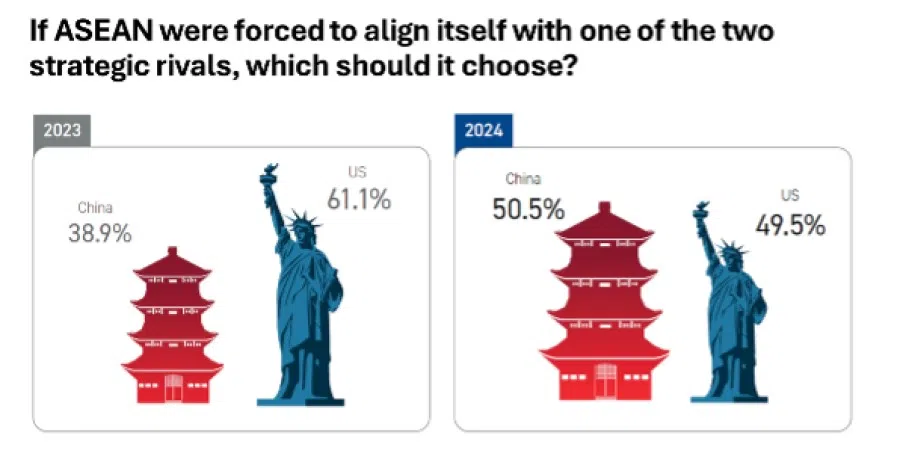
This sentiment is further echoed in a new question assessing dialogue partners' strategic relevance to ASEAN. China has been affirmed as the most strategically significant partner with a mean score of 8.98 out of 11, slightly ahead of the US at 8.79. Most countries in Southeast Asia except Myanmar, the Philippines and Vietnam, ranked China as their top choice.
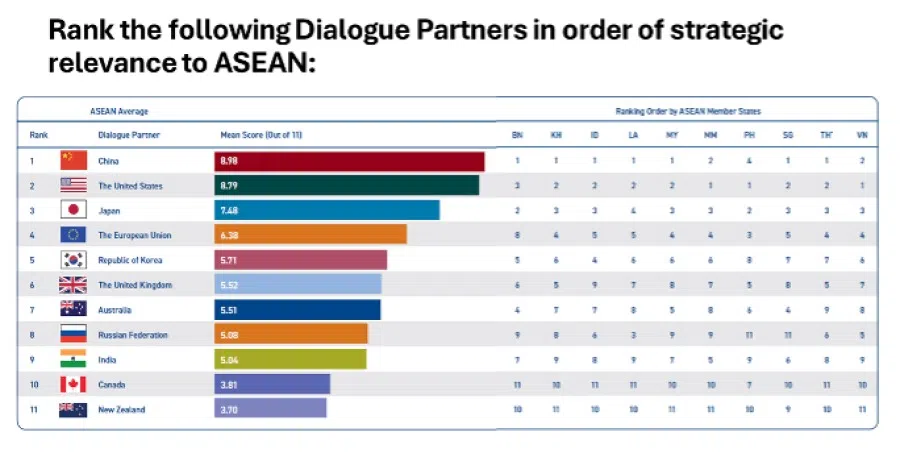
Moreover, it comes as no surprise that China continues to hold its position as the preeminent economic and political-strategic power in the region, with 59.9% and 43.9% of respondents affirming its influence in these respective spheres. Despite concerns about China's potentially diminishing economic outlook, the region remains optimistic about China's economic commitment to Southeast Asia. This sentiment is particularly pronounced in Laos, Thailand, Malaysia and Brunei, where China's status as the largest or second-largest foreign investor underscores its significant economic footprint.
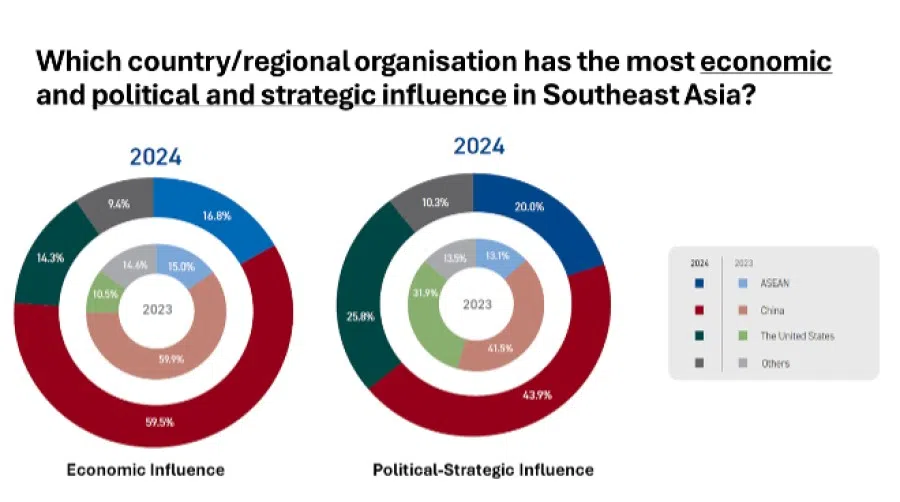
The survey results align closely with the findings of the Lowy Institute's Asia Power Index, which highlights China's salient influence in areas such as economic relationships, diplomacy and people-to-people exchanges. The index also highlights a notable decline in the overall US influence, particularly in countries such as Malaysia, Brunei and Indonesia, further solidifying China's ascendancy in the region.
This increasing engagement has also led to closer and more interconnected supply chains between ASEAN countries and China, facilitating the development of regional trade norms.
China's dominant influence with ASEAN as a whole
The growing influence of China in Southeast Asia is also reflected in its standing within ASEAN. China was among the first dialogue partners to be granted a Comprehensive Partnership Status with ASEAN in 2021, a testament to its deepening ties with the region. Trade volume between ASEAN and China has reached a record high of US$722 billion in 2022, making China ASEAN's largest trading partner for 14 consecutive years, despite China's foreign direct investment to ASEAN lagging behind that of the US, Japan and the EU.
China's pragmatic approach to cultivating ties with Southeast Asia is evident in its active participation in regional integration efforts. From the upgrade of the ASEAN-China Free Trade Area (ACFTA) to its membership in the ASEAN-led Regional Comprehensive Economic Partnership (RCEP) and interest in joining the Comprehensive and Progressive Agreement for Trans-Pacific Partnership (CPTPP), China is playing a pivotal role in shaping regional trade dynamics. This increasing engagement has also led to closer and more interconnected supply chains between ASEAN countries and China, facilitating the development of regional trade norms. China's BRI has also generated goodwill and opportunities across Southeast Asia (despite criticisms of debt trap diplomacy and unfulfilled commitments by China), with its beneficiaries attesting to China's growing role in the region.
Beyond tangible economic benefits, China is actively reinforcing its cultural narrative that emphasises its deep-rooted connections to the Southeast Asian neighbourhood through shared geography, cultural and familiar ties. This narrative reinforces the perception of China as a natural and indispensable partner for the region. Consequently, China's vision of a "global community of common destiny" has garnered significant support from the region. Seven ASEAN countries have expressed varying levels of endorsement towards "China's community with a shared future for mankind".
The latest survey reveals that more than half of the regional respondents view China's overtures favourably, citing their potential to complement ASEAN's efforts (31.3%) and bring positive benefits to Southeast Asia (30.1%). This marks a significant improvement from the 2023 survey where 44.5% of regional respondents expressed little or no confidence that the Global Security Initiative (GSI) will benefit the region, fearing that it would increase tensions between the US and China or force ASEAN countries to take sides.
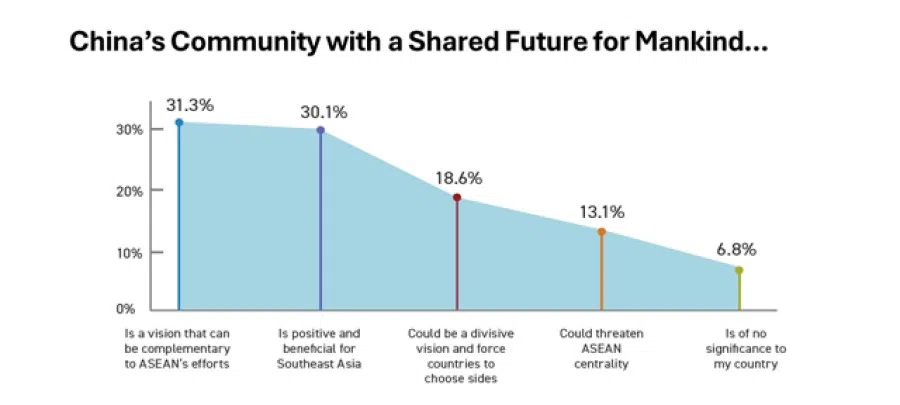
Except for the Philippines, data shows that there is a palpable sense of optimism among Southeast Asians regarding their future relations with China. The percentage of respondents anticipating improvement has surged from 38.7% last year to 51.4% this year, particularly among respondents from Indonesia, Laos and Malaysia who anticipate enhanced relations with China. This is demonstrated by Indonesia President-elect Prabowo Subianto's meeting with Chinese President Xi Jinping on 1 April 2024 - his first overseas visit since securing a victory in the February election, as well as a string of visits to China by Southeast Asian foreign ministers including Laos, Vietnam and Timor-Leste this week.
These concerns have resulted in the region's trust in China dwindling, with a majority of respondents (50.1%) expressing little or no confidence in China's ability to contribute to global peace, security, prosperity and governance, while only 24.8% express confidence.
Caution still remains
However, respondents also temper this optimism, recognising that certain actions taken by China may negatively impact them. Concerns include China's growing economic dominance and political influence in their countries (38.5%); China's strong-arm tactics in the South China Sea and the Mekong (37.2%), which resonates strongly among respondents from Vietnam, the Philippines and Malaysia - countries with territorial claims in the South China Sea; and China's utilisation of economic tools and tourism to punish their countries for foreign policy choices (35%).
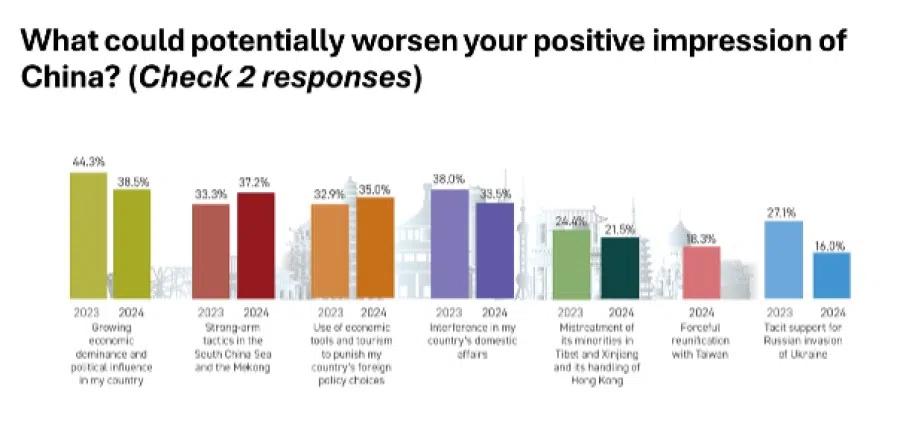
These concerns have resulted in the region's trust in China dwindling, with a majority of respondents (50.1%) expressing little or no confidence in China's ability to contribute to global peace, security, prosperity and governance, while only 24.8% express confidence. Though supporters acknowledge China's vast economic resources and strong political will to provide global leadership, the largest group of respondents who distrust China felt that China's economic and military power could be used to threaten their country's interests and sovereignty.
Southeast Asian countries are particularly wary of China's potential to exploit its economic resources to intimidate its neighbours over foreign policy choices.
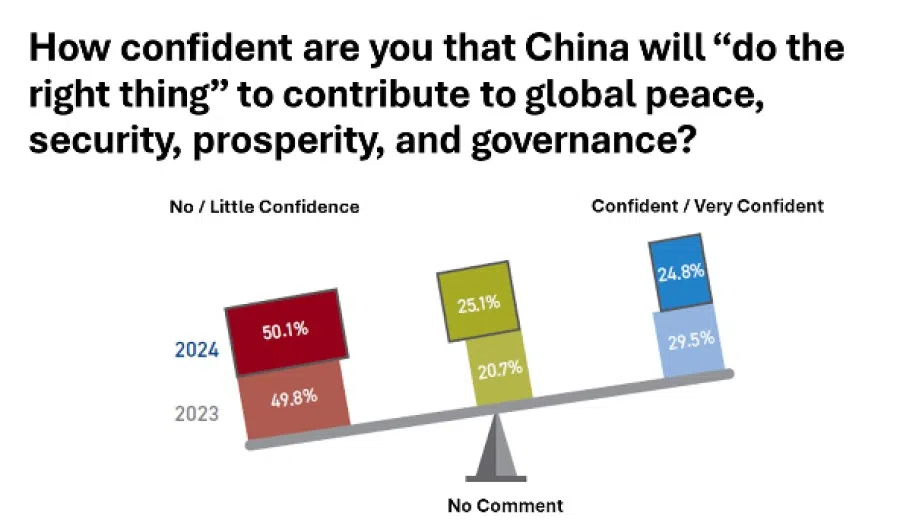
Southeast Asian countries are particularly wary of China's potential to exploit its economic resources to intimidate its neighbours over foreign policy choices. China's efforts to consolidate control over contested territorial claims in the South China Sea - a significant flashpoint in the region - has strained ASEAN-China relations. Recent tensions between the Philippines and China have deteriorated over several flare-ups in the South China Sea and claims over China's economic coercion, highlighting the fragility of regional dynamics and the potential consequences of China's punitive actions.
ASEAN countries have voiced a strong desire to see China resolve all territorial and maritime disputes peacefully in accordance with international law.
Such sentiments are displayed in the survey which shows rising anxiety over China's continually growing economic and political security influence in the region. China is not winning the hearts and minds of Southeast Asians; its increasing prominence instils fear more than it fosters affection. China's actions in the region, such as the enactment of a controversial Coast Guard Law-granting the Chinese Coast Guard the authority to use force on foreign vessels in disputed waters - are not only intimidating but run counter to the region's fundamental principles such as the respect for international law, including the United Nations Convention on the Law of the Sea (UNCLOS).
In light of this, ASEAN countries have voiced a strong desire to see China resolve all territorial and maritime disputes peacefully in accordance with international law. This is the foremost sentiment among the survey respondents, a notable increase from 59.8% last year to 67% this year, indicating a growing regional consensus on the importance of upholding international law. Approximately 60% emphasise the importance of China respecting their country's sovereignty and refraining from constraining their foreign policy choices.
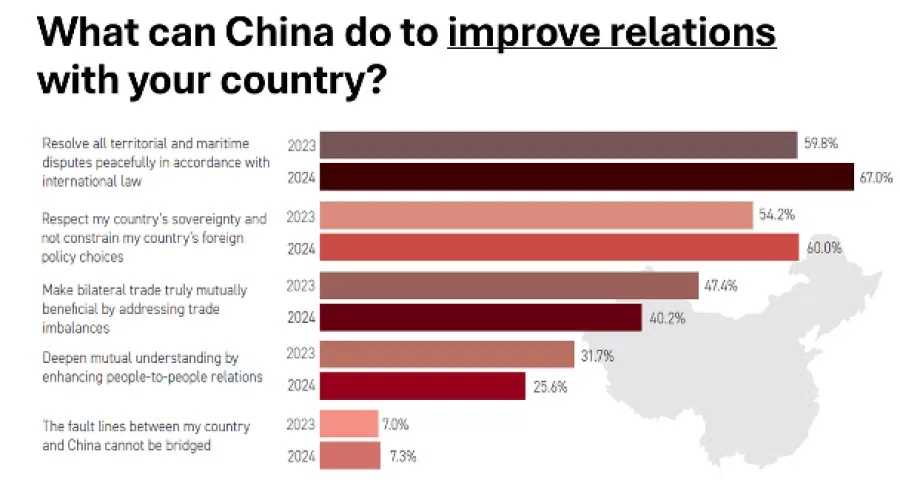
Recognising China's undeniable ascension as a global power, the State of Southeast Asia 2024 survey underscores a prevailing sense of caution regarding its growing influence. ASEAN countries stand poised to remain vigilant and adaptable, recalibrating their approaches - whether through hedging, balancing or bandwagoning-in response to China's actions. Therefore, it is crucial for China to take heed of the region's concerns by fostering constructive engagement and adhering to a rules-based order while navigating the intricate dynamics of regional geopolitics.
This article was first published in Fulcrum, ISEAS - Yusof Ishak Institute's blogsite.
Related: State of Southeast Asia Survey 2024: Choosing China over the US is neither a tidal shift nor a sea change | State of Southeast Asia Survey 2023: Separate tangos with China and the US | State of Southeast Asia Survey 2023: Separate tangos with China and the US





